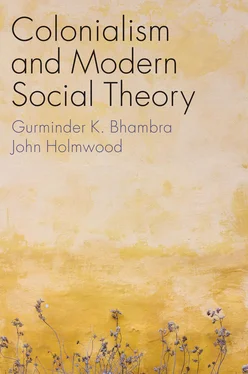Standard histories of the emergence of the state within Europe usually regard the 1648 Treaty of Westphalia as central to the delineation and consolidation of the ideas of national sovereignty and political equality among states. In truth, the sovereignty in question was that of ‘princes’ and has come to be represented as national sovereignty retrospectively, once princely power was itself curtailed. The Treaty of Westphalia put an end to the Thirty Years’ War between Protestant and Catholic powers in Europe – one of the many wars conducted among royal houses and their shifting alliances. It gave the contending princes sovereignty, that is, an authority that came to be associated with territorial boundaries. The key issue, however, is that, in subsequent centuries, European states did not simply exercise their sovereignty within the territorial boundaries of national states. They also exerted power and violence over territories and populations elsewhere. Sovereignty – more properly, mutual non-intervention – was to be respected, and then more in theory than in practice, only in relation to other European powers ; it was not regarded as significant in encounters with peoples and lands beyond Europe. Indeed, as Antony Anghie (2006) argues, the doctrine of sovereignty was itself an explicit statement of the relationship between European powers and allowed the exercise of sovereignty over non-European others as an expression of that sovereignty. This explicitly legitimised, for Europeans, the terms of an imperialism that would incorporate the non-European world into the ambit of European powers – as a ‘right to colonise’ – at the same time as proclaiming these powers’ own sovereignty and right to be inviolable.
Of course, there have been and are many different types of political system in world history. Perhaps the two dominant types associated with the state are the empire and the nation (Clemens 2016). Empires have a longer history than nations and are seen to have existed across many civilisations in a variety of forms – from the ancient Egyptian patrimonial empire to the Chinese feudal empire, passing through Greek and Roman empires of the classical world based on city states and nomadic–sedentary empires such as the Mughal empire. There were also empires of conquest, which resulted specifically from European expansion and colonisation and included primarily the Spanish–American, Portuguese, Dutch, French, and British empires. In his comprehensive study of empires, Shmuel Eisenstadt (1963) compares a variety of empires and, although he notes differences between the political systems under consideration, suggests that there are general characteristics that are common to all of them. In truth, his discussion of European empires in the modern period is very limited, in part because he associates modernity with the development of the nation state, and not with empire. He relegates empires instead to earlier periods in history, despite the fact that the reach of empire is geographically far more extensive in the modern period than it was in antiquity or the Middle Ages.
We distinguish between empires of domination and empires of conquest and extraction and argue that, by assuming the latter form, European colonialism came to create a very different type of empire. Broadly, there is a type of empire that emerges out of pre-existing political formations and, in its expansion and socioeconomic development, takes on the general features identified by Eisenstadt. This type includes the new political form that emerges as a consequence of (1) initiatives taken by rulers indigenous to the territory and (2) the development of centralised administrative and political organs designed to govern a defined, if expanding, territory. Incorporation may give rise to resistance, but it is also generally inclusive, being part of the order of rules and obligations that organise the claims to territory. By contrast, the type we refer to as the modern European empire of conquest and extraction operated at a distance and came to differ from this model in three significant ways. First, expansion involved the subjugation of populations who were subject to rule, but were not part of the order of rule. Second, this subjugation was organised on the assumption of the civilisational, religious, or racial superiority of the invading population. Third, the land and resources of the subjugated population were deemed to be available to the invading population to do with as it pleased. In our view, these elements suggest a qualitative difference between forms of empire. Not to recognise this difference is to perpetuate a false equivalence between political systems that ought to be understood as distinct.
The other aspect to keep in mind here is that the French, British, and Dutch empires (among others) were established during the same period when, it is claimed, they became nation states . The problem is the idea that these states are nation states that have empires – instead of more appropriately understanding what we call nation states as being imperial states, that is, empires organised around the core idea of a national project (one transferred from princes to parliaments). To collapse all varieties of empire into the same form and then to distinguish between empires and nations involves the same sleight of hand. It prevents us from examining what comes to be distinctive about European empires and their post-imperial claim of an underlying essential nation to which empire itself was merely a contingent phenomenon. Within modern European social theory, then, the question of the legitimacy of political rule is primarily discussed in terms of the nation. Since colonisation and the establishment of imperial rule over others cannot be legitimised through such a discourse, it is usually evaded as a matter of relevant concern.
Indigenous peoples in Abya Yala or Turtle Island, territories that we call ‘the Americas’ today, were eliminated and dispossessed by European invaders, who claimed their land and resources in the name of European powers and with the authority of religion. Africans were removed from their own lands and forcibly transported across the ocean, to be coerced into labour on plantations in the New World. The wealth and resources of India were drained primarily by British traders, then by the British government, to the benefit of the ‘mother country’ and its ‘settler offshoots’. After the much vaunted abolition of slavery in the mid-nineteenth century, millions of Indian and Chinese labourers were taken to work on the very same plantations, through systems of indenture (Thiara 1995, Allen 2017). African countries, depleted of their populations through the European trade in human beings, were then colonised for their land and other resources. The Belgian king, for example, appropriated the territory, resources, and population of the Congo (Nzongola-Ntalaja 2002). He extracted a personal fortune through enforced labour in the rubber industry that also led to the deaths of millions of people.
European colonialism was both a collective and an individual endeavour. It was carried out by states and heads of states, but also by European populations, through what has been called ‘emigrationist colonialism’ (Smith 1980). Included among these populations were those of the colonising powers, but also a wider variety of Europeans, for example Poles, Hungarians, and Swedes. Those who were colonised and dispossessed in this process were incorporated into empires of domination and extraction, where the ruling polity understood itself as ‘national’. Colonised others were not part of the national order, for which legitimacy was claimed. While in some cases they were recognised as subjects, they were not subjects insofar as legitimacy claims were concerned.
Читать дальше












